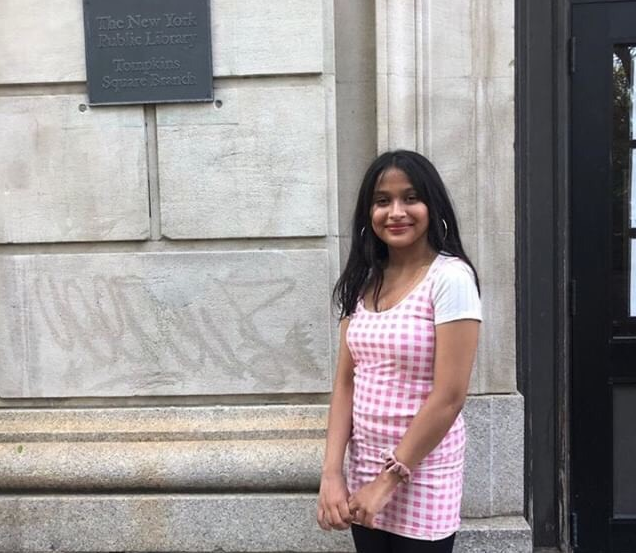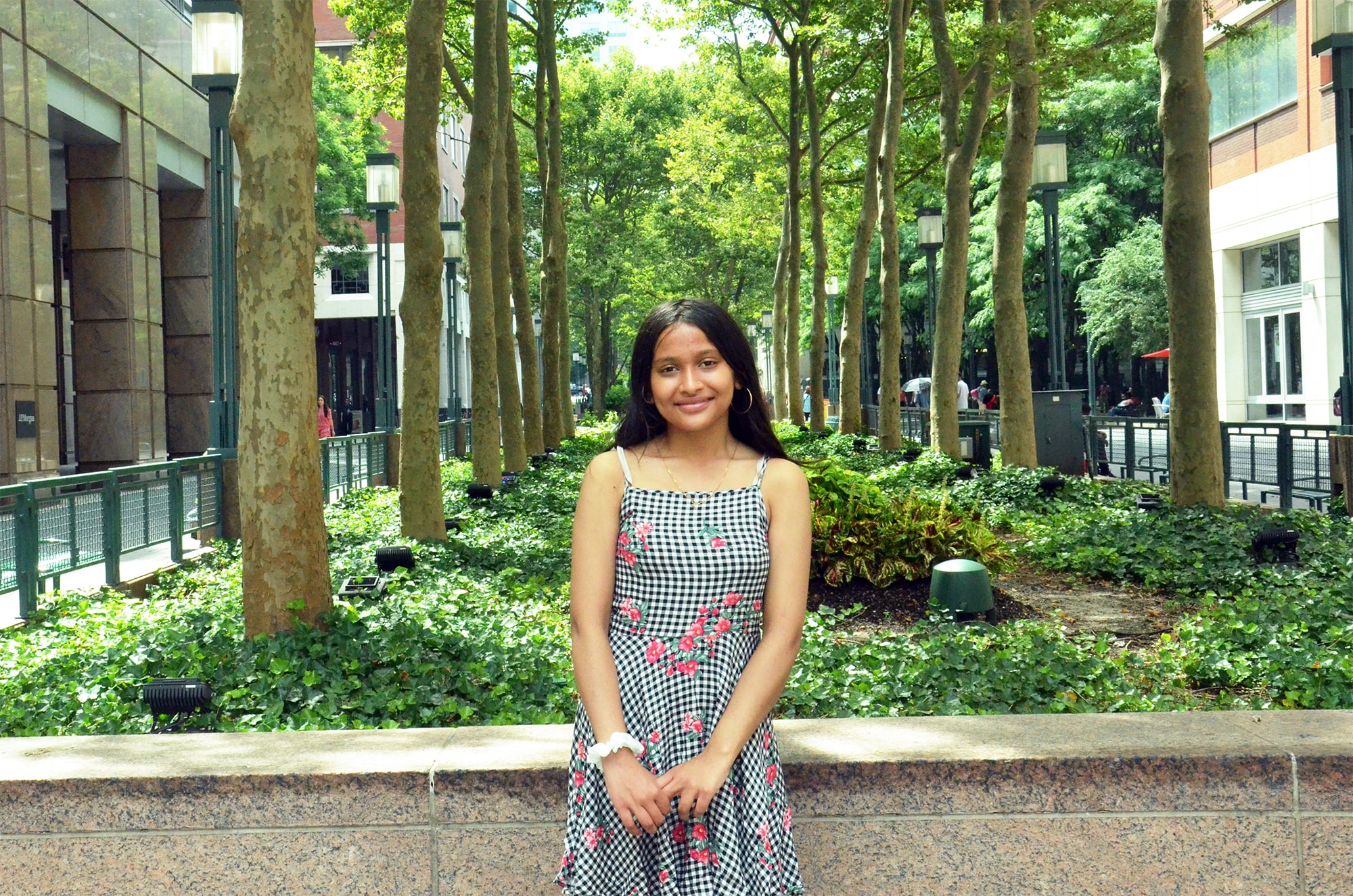Meet Ayesha, a high school student and community advocate
What are you up to this summer?
*
I have SAT prep and a little bit of summer homework.
I was also able to win a grant for the Youth Leadership Council (YLC) I was a part of [this year]* and so during the summer we’re most likely going to be working on that.
What is the grant for and what will you be working on?
My grant is about spreading sexual abuse awareness in at least three different high schools across the boroughs. And by sexual abuse awareness I mean basic things like what classifies as sexual abuse, what you should do. We’ll also provide resources on how you could be a good support system and a good friend for someone who may have gone through something like that, what teachers and guidance counselors can do, and warning signs.
The main goal of it is just to let people know that they have a voice and that if anything like that ever happens, they can always seek help. It’s a very common problem, but a lot of people aren’t aware of that, and a lot of people don’t even know what it looks like. So it’s really just to give people a voice.
Which YLC did you apply to and why?
I applied to the Law Department YLC. Law is something that I’ve always been very interested in. It’s really cool learning about how the justice system works within my city and how it affects youth specifically. Since you learn about how youth in particular go through the justice system, you gain awareness about the kids around you.
When I went to court observations, a lot of the kids in the trials we observed came from my neighborhood or lived around me. And to be honest, I wasn’t too surprised because I feel like my community is not the most supportive.
What would you say to other youth who feel they don’t have a very supportive community?
I understand that it can be very alienating. When I was a bit younger I would resort to just staying home. I feel like social media was a good escape for me—by social media, I mean things like Tumblr or Discord, and finding different online communities.
The internet does provide a lot of different communities. For example, being involved in a fandom makes you feel like you’re a part of something if you’re interested in a specific show, movie, anime, or even book. Because of that shared interest, you have all these people that are very similar to you.
If not online communities, I would suggest going outside and learning more about your neighborhood. One of the things I do is hang out at the library. I have friends there and I have librarians I’m close with, so that’s kind of like my new community.
And being involved in different programs, like YLCs, gives you another safe space to be yourself and do things that you think would be beneficial.

Ayesha outside of the Tompkins Square Branch of the New York Public Library
What advice do you have for someone looking for activities or programs?
I think I got kind of lucky because I applied to a YLC, and then through YLCs you already gain so much access to all of these opportunities, like the grant workshop [where we wrote the sexual abuse awareness grant]. A big reason why I chose to participate in YLCs is because my school doesn’t offer many after school programs.
So if your school is like mine and doesn’t have many after school activities, there are other things, like volunteer work, that are very beneficial to your community. And different museums like the Studio Museum in Harlem and The Metropolitan Museum of Art tend to offer a variety of programs for teens that help you improve your art skills and gain more connections. Colleges also tend to offer free opportunities. Lots of colleges, like Columbia, Barnard, and NYU, offer summer immersion programs.**
It sounds like there’s a lot of variety in your activities. How would you describe your interests?
Like you said, I am interested in a lot of things, including art, coding, and writing. But I was miraculously able to just pin it down to psychology. That’s what I know I want to do as a career. I still don’t know what specifically I want to do, I just know it’s something with psychology—mainly because I do have personal experience with mental health and psychology-related things from family and friends and the community I’m in, the Muslim-Bengali community.
On the subject of mental health: What do you think about the mental health resources available to young people in the city?
You’re not a teenager in New York if you’re not going through some kind of anxiety or depression. Even though New York is such a big city city full of people, we’re not exactly the friendliest; I think this atmosphere contributes negatively to our mental health.
On top of that, because the NYC school system is ranked, so many different communities put so much pressure on their kids to get into these schools, and that also has a bad effect on them.
I feel like more schools should offer social workers or guidance counselors making sure the students are okay. A lot of these students do go through an immense amount of pressure and I’ve just noticed that it’s been very hectic among NYC high school students.
What tips would you give to your peers about taking care of your mental health?
I know it may not seem like it after what I just described, but there is a lot of support you can get; it’s just not obvious because there isn’t really a lot of awareness about the different resources or support systems. There are the hotline numbers for mental health, and if you ever need someone to talk to you could text one of those numbers. And also your guidance counselor; building a relationship with your guidance counselor is good because you’ll have an adult to trust.

You’ve mentioned the pressure in school. What was the biggest adjustment from middle school to high school and how did you handle that transition?
I think the only adjustment I made was to start taking college-related things more seriously. I want to try my best to look good in front of colleges, but I had a hard time freshman year finding things to be involved in because I wasn’t aware of all of these programs.
And to be honest, once I started applying to different programs, I was rejected more than I was accepted. That was difficult because whenever I was rejected I felt kind of lost. I was just like, “What am I going to do now?”
But then I think over time I learned to not be too worried. Now I’m more aware of the different programs, but also that if I‘m rejected, not to be too hard on myself. It’s not really my fault. If there are any areas where you have trouble or something you may have failed at, it’s okay. Failure is something to be expected.
Maybe I do all of these things, but there are still lots of things I have a lot of trouble with. But even though there are things I have trouble with, I’ve learned to accept it and just focus on the things I’m already a part of.
* To learn more about Youth Leadership Councils or apply to join one, visit the YLC Topic page.
** To explore free and low-cost after school activities in NYC, visit the Growing Up NYC After School Guide.
Anijah, 16
Anijah talks about the challenges of growing up with her mother in a single-parent household while balancing her passion for dance with college applications.
Read MoreLyndon, 22
Lyndon shares his journey from being on probation to working with probation clients and what motivates him.
Read More